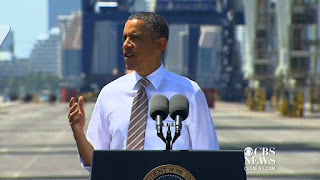 |
| Source:New York Times- "An antiwar protest in Washington in 2007. The war divided the left but ultimately energized it.Credit...Jim Bourg/Reuters" Also from the New York Times. |
"WHEN prominent people in Washington spend an anniversary apologizing for being catastrophically, unforgivably wrong about a decade-old decision, you might expect that the decision in question had delivered their party to disaster or defeat. But last week’s many Iraq war mea culpas were rich in irony: one by one, prominent liberals lined up to apologize for supporting a war that’s responsible for liberalism’s current political and cultural ascendance.
History is too contingent to say that had there been no Iraq invasion in 2003, there would be no Democratic majority in 2012. (It’s easy enough to imagine counterfactuals that might have put Hillary Clinton in the Oval Office.) But the Democratic majority that we do have is a majority that the Iraq war created: its energy and strategies, its leadership and policy goals, and even its cultural advantages were forged in the backlash against George W. Bush’s Middle East policies.
All those now-apologetic liberals who supported the war in 2003 are a big part of this story, because without their hawkishness there would have been no antiwar rebellion on the left — no Michael Moore and Howard Dean, no Daily Kos and all its “netroots” imitators. "
From the New York Times
OK, so I agree with Ross Douthat that the Iraq War has been good for the Democratic Party.
Political history lesson of the day: in 2003 the Republican Party had The White House with President George W. Bush and his administration, as well as a Republican Congress (House and Senate) with small majorities, but large enough for them to put through most of their economic agenda through, at least during that Congress.
With a divided Democratic opposition that really only had the Senate filibuster as a weapon they could use against the Bush Administration and Congressional Republicans. And any communications strategy and message that House Minority Leader Nancy Pelosi, Senate Minority Leader Tom Daschle, and the Democratic National Committee could put together against the Republican Party.
In 2004, President Bush is elected, with a small majority, but enough to get him reelected. House Republicans add a few seats to their thin majority. Senate Republicans go from 51 to 55 seats in the Senate. President Bush is at around 50% approval in late 2004 and going into 2005. This all looks like the Republican Party is not only the majority party, but it's going to be that way for a while.
As the old political saying goes (or one that I just made up) a governing party and majority is only as good as it's ability to govern and lead. You had a divided Republican Party on Social Security reform in early 2005, with House and Senate Democrats having no political reasons to work with Congressional Republicans on SS reform and that dies in the House and Senate by the summer of 2005. Hurricane Katrina happens in the late summer of 2005 and the disaster and the Bush Administration showing almost no ability to deal with that disaster and cleanup happens as well.
Going into the summer of 2005, I don't think anyone was predicting that House and Senate Democrats had any real shot at either winning back the House or Senate in 2006, but the debacle in the Iraq War, and hurricane Katrina, President Bush's low 30s approval rating by late 2005, as well as the corruption that was going on with House Republicans that year and into 2006, started this feeling in the country, especially with Democrats and Independents, that united government wasn't working and Republican Party needed a check in Washington.
So yes, the War in Iraq has been good politically for the Democratic Party, especially when you look at where they were in 2003 and where they were less 4 years later. But the country has paid a helluva a price for it economically and militarily that I believe most Americans would love to go back to pre-Iraq War and thinking there's no real good reason to ever invade Iraq, at least at this point.
You can also see this post on WordPress.


















